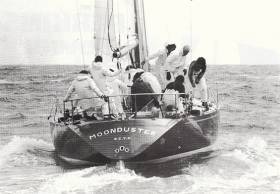Displaying items by tag: Sir Ernest Shackleton
Hello and welcome aboard this week’s edition of your maritime programme Seascapes .....this week we hear about efforts afoot to assist in the restoration of “Moonduster”; we have the results of our recent competition for copies of Carsten Kriegers ‘ “This Is the Burren” courtesy of The Collins Press ; we talk to Donal Boland whom we met last weekend in Athlone whilst we were at The Dive Ireland Conference about a gathering in Lynches of Tullamore this weekend focussing on The Mid Shannon with a wide range of speakers; how the British Ambassador to Ireland HE Mr Dominick Chilcott earlier this week paid homage to Sir Ernest Shackleton and members of the Imperial Trans Antarctic Expedition and the Centenary of their return home with Tom Crean and our many maritime heroes celebrated by author Michael Smith who addressed the large gathering in the Ambassadors’ residence with descendants of the Shackleton and Crean families present, the Shackleton Mueseum in Athy and all branches of the forces including Chief of Staff of The Defence Forces – Vice Admiral Mark Mellett just returned from Mali..... ....first this week to last weekend’s Skipper Expo in Galway – Seascapes was there on Saturday where we met many regular listeners and contributors – one man whom I remember reading as a young boy was there, the veteran journalist and founding editor of The Skipper now in his eighties Arthur Reynolds had this to say....
Read also WM Nixon: Why Moonduster Should Not Make Ireland Her Home After Restoration
Below the Surface Lecture: Sir Ernest Shackleton – a Family Perspective
#JEANIE LECTURES – Having started this month, the 'Below the Surface' series of six lectures is a celebration of Ireland's maritime heritage and archaeology. They are held on the first Wednesday of each month on board the replica 19th century barque Jeanie Johnston in Dublin Docklands. The next lecture on 5th December is about Sir Ernest Shackleton, one of Irelands greatest polar explorers.
The talk presented by historian and guide - Jonathan Shackleton will give a unique insight by delving into his family background of the polar explorer and for his reputation and growth in four expeditions to Antarctica.
Doors open at 7.15pm (lecture starts 8pm) and those attending will experience an intimate space ideal for maritime tales, oozing with seafaring ambience with the creaking sounds of the hull.
It is advisable to arrive early as entry to venue will not be possible upon commencement of the lecture venue. The emmigrant famine museum ship is berthed alongside Custom House Quay. To book online tickets costing €15 each, click the link HERE
Liverpool’s Last Chance to See Shackleton
Visitors to the Merseyside Maritime Museum have just over a fortnight to view Endurance: Shackleton's Antarctic Adventure! writes Jehan Ashmore.
The exhibition which has been running since last July, tells the epic story of Sir Ernest Shackleton's 1914 expedition and the incredible real life tale of survival. For over two years, Shackleton and his men became castaways during their Antarctic ordeal.
Also featuring in the exhibition are 150 compelling images taken by the ships photograph, Frank Hurley who saved the negatives from perishing in the icy waters.
The Endurance exhibition ends on Sunday 27 February and admission is free. For further details logon to the National Liverpool Museums website here
Last year the Dublin Port Company named a new tug, Shackleton in honour of the Athy-born, polar explorer and a sister tug was named Beaufort after the Navan-born innovator, Sir Francis Beaufort.
To read about the tugs in their starring role in an advertisement made for the National Lottery last year click this link and to see the tugs in Making Magic mode click video






























































